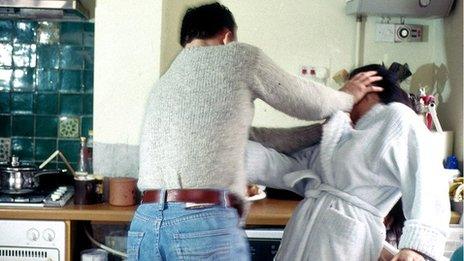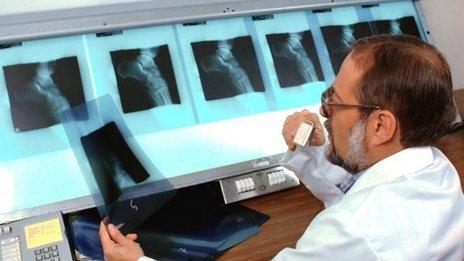Domestic violence 'wake-up call' issued by watchdog
- Published

The NICE says one in three women is likely to experience domestic violence
Doctors and nurses should receive special training so they can recognise the signs of domestic violence and ask questions, the health watchdog says.
The National Institute for Health and Care Excellence (NICE) is publishing new guidance to raise awareness among those coming into contact with victims.
NICE said its recommendations were a "wake-up call" to the problem.
It says each year at least 1.2 million women and 784,000 men in Wales and England experience domestic violence.
One in three women and nearly one in five men are likely to experience it at some point in their lives.
Experts believe these figures probably underestimate the problem, with many cases going unreported to health or social services and the police.
The watchdog says research suggests domestic violence costs the UK an estimated £15.7bn a year. This is made up of "human" costs - healthcare, criminal justice bills, costs relating to social services and refuges, as well as working days lost owing to injuries.
Joined-up approach
NICE says doctors and nurses need training to help them ask about abuse, to respond effectively and to encourage patients to seek help from specialist services.
The watchdog wants universities and medical schools to ensure training on domestic violence is included in their curriculums or to strengthen what content there currently is.
The guidance says: "Health and social care service managers and professionals should ensure front-line staff in all services are trained to recognise the indicators of domestic violence and abuse and can ask relevant questions to help people disclose their past or current experiences of such violence or abuse.

NICE wants all front-line NHS staff to think to ask their patients if they are being abused
"The inquiry should be made in private on a one-to-one basis in an environment where the person feels safe, and in a kind, sensitive manner."
The new guidance calls for greater co-operation between different agencies, such as health service providers, the police, housing services and schools.
The guidelines also urges health managers to "create an environment for disclosing domestic violence and abuse", for example by displaying information for those affected in waiting areas and other suitable places.
Prof Mike Kelly, director of the centre for public health at the NICE, said the guidance was designed to "provide a wake-up call" to a "significant problem".
"Domestic violence and abuse are far more common than people think. Everyone in society needs to understand both the extent of the problem and the damage it causes," he said.
Training
Dr Adrian Boyle, accident and emergency physician at Addenbrookes Hospital in Cambridge, said: "In emergency departments, we see a lot of patients who are experiencing domestic violence, including those who don't feel able to tell us what is happening to them.
"What happens next is variable - there are places which do excellent work identifying and responding to these individuals... but equally there are places with no extra support for those who come forward.
"At the moment there is no requirement for staff to be trained, but what this new guidance recommends is that all staff should be trained to respond well to patients who chose to confide what is happening to them."
Polly Neate, chief executive of charity Women's Aid, said healthcare professionals often worked in the only safe spaces a woman could visit and be supported without arousing the suspicion of their abuser.
She said: "We urge decision makers in health and social care to implement the recommendations on training for front-line staff and recognising and utilising the expertise available in specialist domestic violence services.
"We hope these guidelines will empower social and healthcare professionals to watch out for domestic violence, and act alongside specialist services to support the women experiencing it."
- Published19 September 2012
- Published31 March 2012